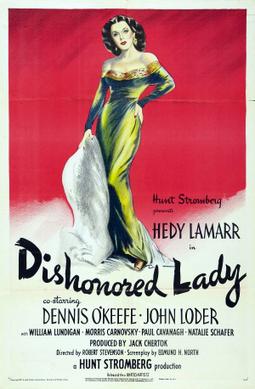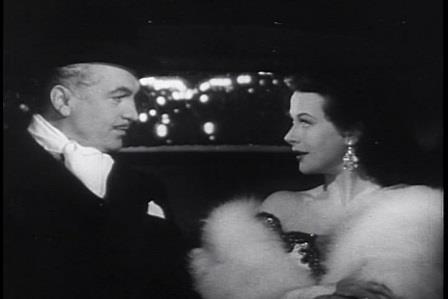Unbridled passion . . . scandal . . . murder!
We come back today to Hedy Lamarr, an actress we’ve perhaps returned to a few times too many given her film output. Nonetheless today we’ll look at 1947’s Dishonored Lady, one of Lamarr’s first films made after leaving MGM.
Like her other film from roughly the same period, The Strange Woman, in Dishonored Lady we again see Lamarr trying valiantly to carry an entire picture on her shoulders. Only here instead of George Sanders and Louis Hayward as supporting players we are given Dennis O’Keefe and John Loder.
The distinction in supporting cast is definitely palpable as Lamarr’s best pictures are those in which she has strong support or is the leading lady in support of a stronger actor. Sadly either here could have made an intriguing if somewhat stunted picture much more dynamic and engrossing.
Though the pacing is at times a bit slow, there is a lot going on in Dishonored Lady. Much of it- and most attempts at fleshing out Lamarr’s character, magazine executive Madeleine Damien are superficial and fumbled, leaving us still wondering what drives the woman.
Madeline is a fashion editor during the day and spends her nights hopping from club to club and from man to man, if one is to believe the gossip from her office. Out of perhaps pressure, boredom, or some subconscious wish to emulate her father (a womanizer himself) she beds major advertiser and local jeweler Felix Courtland (John Loder).
As news of her latest escapade makes the rounds at the office, she finally blows her top and quits after being confronted about it again by ad salesperson Jack Garet (William Lundigan). Tired of her life, she creates a new identity on the other side of town for herself as a painter (also her father’s profession). While in this guise she meets and falls in love with research doctor David Cousins (Dennis O’Keefe).
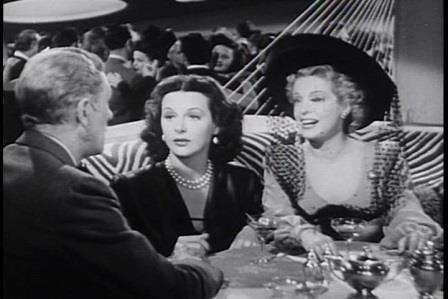 Things begin to go sideways from there as Madeleine never manages to fess up to David and still gets roped into helping former colleagues at the office (including Ethel Royce as played by Natalie Schafer of Gilligan’s Island fame). Oh, and she still runs into Felix Courtland from time to time. He’s a bit of a stalker as he also manages to get keys to her apartment without her knowledge.
Things begin to go sideways from there as Madeleine never manages to fess up to David and still gets roped into helping former colleagues at the office (including Ethel Royce as played by Natalie Schafer of Gilligan’s Island fame). Oh, and she still runs into Felix Courtland from time to time. He’s a bit of a stalker as he also manages to get keys to her apartment without her knowledge.
Without giving too much away, there’s a theft and a murder and Madelieine’s accused of both. In a bit of an anticlimactic court scene Madeleine finally takes the stand to share her story.
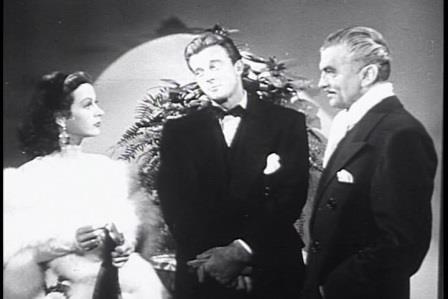 Dishonored Lady easily keeps your attention in spite of the at times sluggish pacing, but it leaves so much on the table on wonders if the script couldn’t have used another rewrite. Interspersed throughout are scenes with Madelieine’s psychiatrist (Morris Carnovsky). He dabbles with talking about her family history and perhaps what is driving her behavior. However each time we think we are about to learn at least a little bit of what is making her tick we move on as if nothing happened. It’s a great lost opportunity and even by the end of the picture we are still left wondering.
Dishonored Lady easily keeps your attention in spite of the at times sluggish pacing, but it leaves so much on the table on wonders if the script couldn’t have used another rewrite. Interspersed throughout are scenes with Madelieine’s psychiatrist (Morris Carnovsky). He dabbles with talking about her family history and perhaps what is driving her behavior. However each time we think we are about to learn at least a little bit of what is making her tick we move on as if nothing happened. It’s a great lost opportunity and even by the end of the picture we are still left wondering.
Even with that said, it is clear that a statement is being made here about judging people based on their pasts. What is clear is that in spite of her numerous partners and disdain from those around her as a result of her lifestyle, Madeleine is anything but a dishonored lady as the title implies. If anything she has a bit more honor than her colleagues. Note at the magazine that she is the only one not in the ‘old boys club,’ both in fact and in spirit. One can assume, especially from Jack, that he’s accustomed to doing whatever it takes to get the deal done. It’s easy to figure Jack’s had more than a few women in his life and enough drinks to sink a ship.
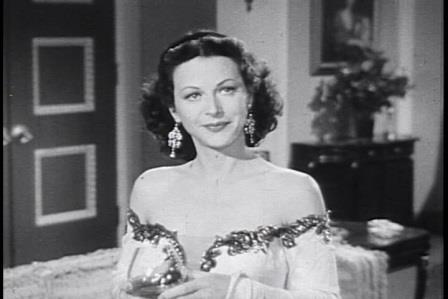 In spite of having her character not be fully fleshed out (though much more complete than that of her costars), Lamarr does a pretty good job in keeping things moving. As usual she’s bedecked in one luscious gown after another, though of course these aren’t from Adrian, her normal designer at MGM.
In spite of having her character not be fully fleshed out (though much more complete than that of her costars), Lamarr does a pretty good job in keeping things moving. As usual she’s bedecked in one luscious gown after another, though of course these aren’t from Adrian, her normal designer at MGM.
Dennis O’Keefe takes the lead in the parade of the supporting cast. In a change of pace from his usual role as a heavy, here he takes on a softer and more sensitive role with some success. Though he becomes in quick order Madeleine’s fiancé, there is no backstory provided for him- he’s just a sounding board to absorb Madeleine as she runs from her old life.
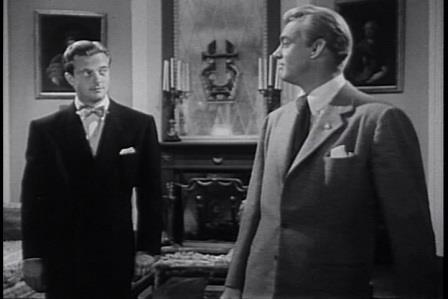 Likewise Courtland and Jack Garet are also simple characters without any depth. Courtland is yet another in a long line of lovers, with the only key difference being that he stuck around, not taking his tryst with Madeleine for what it was, a one-night stand. And as for Jack, he’s just a simple self-entitled jerk who serves only as vehicle to force Madeleine over the edge and leave her job and leech off of Courtland himself a bit later.
Likewise Courtland and Jack Garet are also simple characters without any depth. Courtland is yet another in a long line of lovers, with the only key difference being that he stuck around, not taking his tryst with Madeleine for what it was, a one-night stand. And as for Jack, he’s just a simple self-entitled jerk who serves only as vehicle to force Madeleine over the edge and leave her job and leech off of Courtland himself a bit later.
Again, a lot of potential but not much in terms of results. Though most would agree that Loder and O’Keefe aren’t Hayward and Sanders, in their defense they aren’t given much to work with.
Another factor in some of the ill-will the film has created over time is the issue it had in simply getting released. Evidently earlier versions of the script were more explicit in Madeleine’s carousing and even included an additional affair in Mexico, which was cut entirely along with much of her sordid family history.
Watching Dishonored Lady isn’t hard as it has been in public domain for years and can even be downloaded from archive.org. The challenge in watching it is getting a good copy as with so many cheaply produced or badly edited versions out there (as is the norm with most public domain films) it is easy to get a hack job which will diminish your enjoyment of the film.
